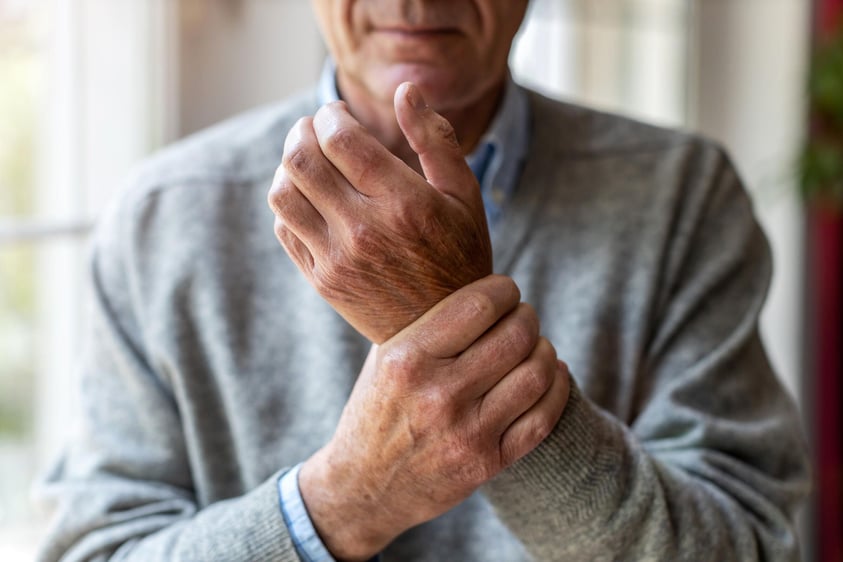Rheumatoid arthritis (RA) is a systemic disease, meaning it can affect the entire body. Inflammation occurs and can attack tissues related to joints and body organs alike. Signs and symptoms of rheumatoid arthritis regularly occur in the wrists, hands, or feet and can often have times of remission as well as flares. While there are many, these are often seen as the top 4 symptoms of Rheumatoid Arthritis.
When someone has rheumatoid arthritis (RA), the immune system can attack their own cells by mistake, resulting in uncomfortable, painful and damaging symptoms. RA results from a problem with the body's immune system. When a person's immune system is healthy, it aids in fighting off infection and sickness.
Joint Pain
For some, joint pain presenting as a rheumatoid arthritis symptom happens gradually over several years; in others, it may come on quickly. Most commonly RA joint symptoms present as pain, tenderness, and/or achiness in more than one joint.
Typically this pain isn't fleeting and will likely last for longer than 30 minutes. It has a high tendency to present in both sides of the body, such as both knees, or hands, etc. creating symmetrical joint involvement. RA pain is known for being worse in the morning, and improving with movement.
Hot or cold packs can help reduce joint pain. You can start using these packs as soon as symptoms appear. It’s important to avoid placing hot or cold substances directly on the skin. Instead, wrap the pack in a towel before applying it to the affected area.
When dealing with pain management medications, over the counter or otherwise, it's important to discuss the best plan of action with your physician to ensure it is both effective and safe.

Joint Stiffness/Inflammation
Closely related to joint pain, stiffness is another common symptom. This can happen as joints swell from inflammation and make mobility feel difficult and sometimes impossible. Just like joint pain, it typically shows in matching joints and is often more prevalent after sleep or long periods of inactivity.
Inflammation can aid in the body’s ability to heal, but chronic inflammation may increase the risk for other health or physical complications.
Combating inflammation can happen in many areas of our day to day lives. Diet plays a large role in this. Omega 3’s can be helpful for arthritis and other conditions and can be found in forms of fish, soy, nuts and seeds.
Incorporate plenty of fiber-rich foods in your diet, such as whole grains, beans, nuts, fruits, and vegetables. Choose heart-healthy fats like extra virgin olive, walnut, and flax oils which contain omega-3 fatty acids and may have other benefits.
You can also maintain joint movement and overall function with physical therapy and exercise. Hot and cold packs can also aid in decreasing inflammation.

Fever
Having a low-grade fever can be a normal part of living with RA. It can be caused by inflammation in the joints or an immune system that isn't working properly. While this isn't something completely unexpected, a fever can be an indicator of an underlying bacterial or viral infection or a nonresponse to immunosuppressive medication.
RA fevers should be treated like any other fever. Guidelines may recommend to try an over-the-counter, anti-inflammatory medication that treats fever, such as ibuprofen or acetaminophen. Make sure you are adequately hydrated and give yourself the opportunity to rest. A cold compress to the forehead or neck is a natural remedy to help in lowering your temperature.
If you have RA and are experiencing a fever that seems unresponsive to over the counter medications or natural remedies, you may want to contact your doctor, because it could be something more serious like an infection.

Fatigue
Inflammation inside the body can also lead to general feelings of weakness, extreme tiredness and a heightened desire to rest or sleep. Fatigue is commonly reported by patients with this and other autoimmune conditions but is rarely targeted intentionally in treatment plans. RA fatigue is different from normal tiredness because it is extreme, often not earned, and unresolving with sleep. This symptom is especially difficult as it can present not only physically but also cognitively and emotionally, especially in those dealing with a chronic issue.
Try following best practices like sticking to the same sleep schedule daily and limiting blue-light exposure before bed. If pain regularly interferes with your sleep, consider keeping a bedside arsenal of tools—heat and ice, splints and extra joint-supporting pillows—to defeat pain on the spot.
You can also focus on replenishing your mental energy with activities that gently energize such as meditation, breathing exercises or allowing yourself to take time to do something that's uplifting or relaxing.
Regular exercise or movement routines can greatly improve the feeling of physical weakness. Yoga, forms of stretching, walking and swimming have all shown to help in decreasing the feeling of weakness as well as mobility. Always listen to your body and find the right level of exertion for you personally. Take it slow, gently, and know your limits.
Managing Symptoms
Although there isn't a cure for Rheumatoid Arthritis, early, aggressive treatment will help prevent disability and increase your chances of remission. It is important to listen to your body's needs and support it in overcoming or managing these symptoms in a positive way. These symptoms, if left unchecked, can worsen and add complications to an already complicated disease.
As always with a chronic illness, it can be especially helpful to seek support from family and friends, and be patient with yourself on your health journey. Mymee certified health coaches are here to help you minimize your symptoms of rheumatoid arthritis.



